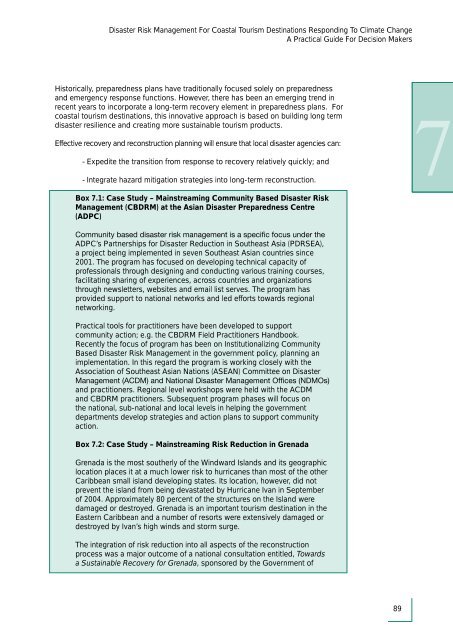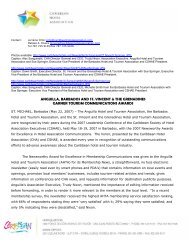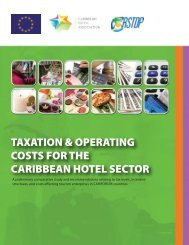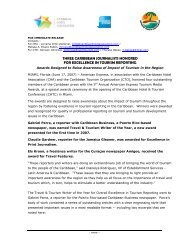Disaster Risk Management for Coastal Tourism - Caribbean Hotel ...
Disaster Risk Management for Coastal Tourism - Caribbean Hotel ...
Disaster Risk Management for Coastal Tourism - Caribbean Hotel ...
Create successful ePaper yourself
Turn your PDF publications into a flip-book with our unique Google optimized e-Paper software.
<strong>Disaster</strong> <strong>Risk</strong> <strong>Management</strong> For <strong>Coastal</strong> <strong>Tourism</strong> Destinations Responding To Climate Change<br />
A Practical Guide For Decision Makers<br />
Historically, preparedness plans have traditionally focused solely on preparedness<br />
and emergency response functions. However, there has been an emerging trend in<br />
recent years to incorporate a long-term recovery element in preparedness plans. For<br />
coastal tourism destinations, this innovative approach is based on building long term<br />
disaster resilience and creating more sustainable tourism products.<br />
Effective recovery and reconstruction planning will ensure that local disaster agencies can:<br />
- Expedite the transition from response to recovery relatively quickly; and<br />
- Integrate hazard mitigation strategies into long-term reconstruction.<br />
7<br />
Box 7.1: Case Study – Mainstreaming Community Based <strong>Disaster</strong> <strong>Risk</strong><br />
<strong>Management</strong> (CBDRM) at the Asian <strong>Disaster</strong> Preparedness Centre<br />
(ADPC)<br />
<br />
ADPC’s Partnerships <strong>for</strong> <strong>Disaster</strong> Reduction in Southeast Asia (PDRSEA),<br />
a project being implemented in seven Southeast Asian countries since<br />
2001. The program has focused on developing technical capacity of<br />
professionals through designing and conducting various training courses,<br />
facilitating sharing of experiences, across countries and organizations<br />
through newsletters, websites and email list serves. The program has<br />
provided support to national networks and led ef<strong>for</strong>ts towards regional<br />
networking.<br />
Practical tools <strong>for</strong> practitioners have been developed to support<br />
community action; e.g. the CBDRM Field Practitioners Handbook.<br />
Recently the focus of program has been on Institutionalizing Community<br />
Based <strong>Disaster</strong> <strong>Risk</strong> <strong>Management</strong> in the government policy, planning an<br />
implementation. In this regard the program is working closely with the<br />
Association of Southeast Asian Nations (ASEAN) Committee on <strong>Disaster</strong><br />
<br />
and practitioners. Regional level workshops were held with the ACDM<br />
and CBDRM practitioners. Subsequent program phases will focus on<br />
the national, sub-national and local levels in helping the government<br />
departments develop strategies and action plans to support community<br />
action.<br />
Box 7.2: Case Study – Mainstreaming <strong>Risk</strong> Reduction in Grenada<br />
Grenada is the most southerly of the Windward Islands and its geographic<br />
location places it at a much lower risk to hurricanes than most of the other<br />
<strong>Caribbean</strong> small island developing states. Its location, however, did not<br />
prevent the island from being devastated by Hurricane Ivan in September<br />
of 2004. Approximately 80 percent of the structures on the Island were<br />
damaged or destroyed. Grenada is an important tourism destination in the<br />
Eastern <strong>Caribbean</strong> and a number of resorts were extensively damaged or<br />
destroyed by Ivan’s high winds and storm surge.<br />
The integration of risk reduction into all aspects of the reconstruction<br />
process was a major outcome of a national consultation entitled, Towards<br />
a Sustainable Recovery <strong>for</strong> Grenada, sponsored by the Government of<br />
89








